Female journalists’ network “La Sala” promotes gender equality in exile in Costa Rica
The role of women in journalism in Nicaragua is not dual. That’s why women managers from ten online media have set up a network to provide peer support and negotiate better pay.
“I’m a journalist, a leader of my own media and a woman. When I started talking to women journalists, we realised we had the same concerns.”
So says Abigail Hernández, who runs Galería News, a news website specialising in photojournalism. Together with other Nicaraguan women journalists, she founded the La Sala consortium, which Vikes has supported as part of a development programme in Central America.
According to Hernández, common concerns for women included the fact that women had fewer jobs than men and that women-led media were not funded in the same way as men-led media.
Many women have set up their own online media.
“I asked them why, and some said they were fed up with sexual harassment, others said there were no opportunities for advancement in their previous job. A third wanted to focus more on issues such as human rights.”
Journalists in exile
As the political crisis in Nicaragua escalated in 2018 and the regime started to close down media outlets, many small online media outlets were set up in the country. Hernández estimates that there are around 35 of these. A dozen are led by women.
In practice, they are all run from Costa Rica, as independent journalists in Nicaragua have gone into exile under the dictatorship of Daniel Ortega.
It is also home to La Sala.
“We have ten women leaders, and our media are the smallest and least funded of all,” says Hernández.
For example, women have tried to raise the level of bonuses. Typically, male journalists refuse too little pay, but women even ask to be given the jobs that men miss, as there are few jobs available. During the Korona era, many men refused to go to hospitals for fear of falling ill, leaving women to do almost all the dangerous work.
“We should learn from men to be a bit more aggressive and dare to defend our rights better,” says Hernández.
“But if you demand your rights loudly, you will be labelled as a conflict seeker. That’s why it’s better if we can hold our own as one of the ten media.”
Equality so far at the level of talk
“Men talk about equality, but they don’t yet understand it,” says Hernández.
She says that men in the media may talk and write about violence and pay inequality faced by women, but in practice women are mostly seen as subcontractors or assistants, and funding is channelled to male-run media.
Central American media receive funding from abroad, typically from Western development cooperation, but in order to get it they have to show high readership figures. But it is difficult to get big figures if you have a small budget. Then you can’t grow, and you can’t get the funding to grow.
Women report on human rights
According to Hernández, the women-led Nicaraguan media typically focus on environmental news and human rights. They may do stories about missing women and teenagers and tell you about the work of human rights organisations.
“In Nicaragua, more than 3,000 different rights organisations have been banned, and we have ten online media outlets that highlight their issues,” he concludes.
All women have to work as communications consultants to finance their own media, and all have families to look after, many as single parents. Many are overworked, and with such a load they cannot produce as much news as men can. Male journalists typically have wives who look after the children.
“That’s why we created La Sala, so that we have a forum where we can talk about these issues.”
The dream is that it would be easier for younger people
Vikes has supported the production of stories by media run by women journalists and collaborated with a think tank on the culture of peace.
La Sala would also like to start a mentoring programme for women and entrepreneurship training, as many journalists are not experienced entrepreneurs.
Hernández has also started to make contact with women journalists in leadership positions in Costa Rica to see if they share the same problems and what kind of cooperation Nicaraguans could offer in their new home country.
“We have also spoken to a female journalist from El Salvador who does the same type of work there. The idea is to create a regional network where women could get support.”
She says that all women leaders are in their 40s, and the common desire is that younger women should not have to go through what they have experienced in the industry.
“We want to give women the tools to develop in journalism, as this is still a male-dominated field,” says Hernández.
“Women are constantly having to prove themselves as good journalists, photographers and leaders.”



